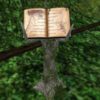It’s hard to say much that’s absolute about Druid creed, because as part of their creed they were not absolutist thinkers. The culture the Druids would be most like is the Magi, and they would often later be called Magi in Latin records of them. They were rationalists, but not materialists.
Before the advent of empirical method, and the modern materialistic view, science did in a way still exist. Science was known as natural philosophy, but Druids didn’t stick to natural philosophy. Natural philosophy was the idea that nature could teach us about itself, and about creation in general. Druids were both natural philosophers, and theologians. They did engage in contemplations of God, but not in the modern sense. God in the metaphysical sense as a part of explaining why the world behaves as it does, and in drawing conclusions about how to handle human needs. There are rumours that Druids engaged in “evil practices”, but this is not really supported either in archaeological evidence, or in what survives of their lore in the “old wives tales” originating from western Europe. They were in a sense ascetics, living with nature and not choosing to undertake work like agriculture on a larger scale, or warfare.
Their spiritual views were an interesting paradox, both dualistic and also not. They acknowledged a visible natural world, and an unseen world, but unlike the modern views of heaven these weren’t seen as actually separate. So you weren’t going to “go to heaven”, or hell. Your actions would just cause a natural reaction either in this life, or the next. They saw that life was a rule. In their view it did not end, ever. So your soul which was immortal just sort of migrated, and would reincarnate after a time, and anything appropriate from your past incarnation would still be pending in your new life.
They didn’t look to the Gods as distant sources of law. For them the Gods lived here in the invisible part of the world, and what you did, or didn’t do, for or against them, would have an immediate or prompt consequence. So their respect for the Gods was more of a good citizenship than an actual subordination to the Gods. Their culture and belief system didn’t actually have slavery as we know it, so the idea of owing utter obedience to even a God wouldn’t have made sense to them. They didn’t see the Gods as caring about every little thing we do. In Druid belief, some things were really just on your head, your good or bad decision.
So they didn’t go to the spirits for every little thing like some do today? Nope. Were the Gods seen as protectors of the earth? They were sort of like the Greek cynics in a loose sense. The Gods were the agents of change in the earth. So yes, in a sense protectors. The Druids saw that we have a natural way of being, and they saw the connection between human behaviour and animal, and openly accepted it as the cynics did. If a Druid spoke in correction of someone’s behaviour, it would be from insight into nature. Druids themselves would often change their name. The position of Druid not being one you could be born into, and were often called serpents or piglets, and were known to take animal, or even tree names, having seen humanity as descended from trees. So indiscriminate killing was not acceptable of trees, or animals.
They didn’t forbid hunting or lumbering, but they were the authority of how and where it could be done, and would remain so until the increase of temporal power of the tribal chieftains. Though there is some evidence that even then Druids would “go underground” rather than living as they were accustomed near their sacred groves. Merlin likely didn’t at first acknowledge to Uther that he was a Druid, but accepted Merlins insight as a part of his intended political coupe. The Druids never before having done that.
Druid creed has elements much like Greek Gnosticism. Nature matters, but the person matters also, and they are not separate. Being called a snake wasn’t an insult, or a piglet, or any of the animal insults we use now. It was seen as sort of an obvious relationship, and it would be like me calling you people. The cycle mattered more than any specific station on it, and thus the Druid God of the hunt survived, and was latter adopted in wiccan traditions.
What we know of the Druids Gods is mostly preserved in a loose correspondence to the Greek/Roman Gods, and they didn’t equate perfectly. They also didn’t have a God for every God in the Greek pantheon say. They had a sky father, and a brother deity of the underworld who was not evil. He was just the corresponding power of the land of the dead which was just part of the cycle. There were also ancestral figures who were acknowledged to have made a strong connection with nature/the Gods. I guess they would be demi-Gods, Manannán mac Lir and such figures. The Bard Taliesin, not unlike the Chinese immortals really.
Druids did acknowledge the sacred feminine, and there are references to female Druids. The word dryad. Perhaps much like Native American shamanism they did seem to, at least in part, form separate societies though there was no conflict between them. Perhaps just the respective observance of the masculine versus feminine mysteries.
Your thoughts are welcome. Be well friends.
Travis Saunders
Dragon Intuitive
~science,mysticism,spirituality~



Leave a Reply